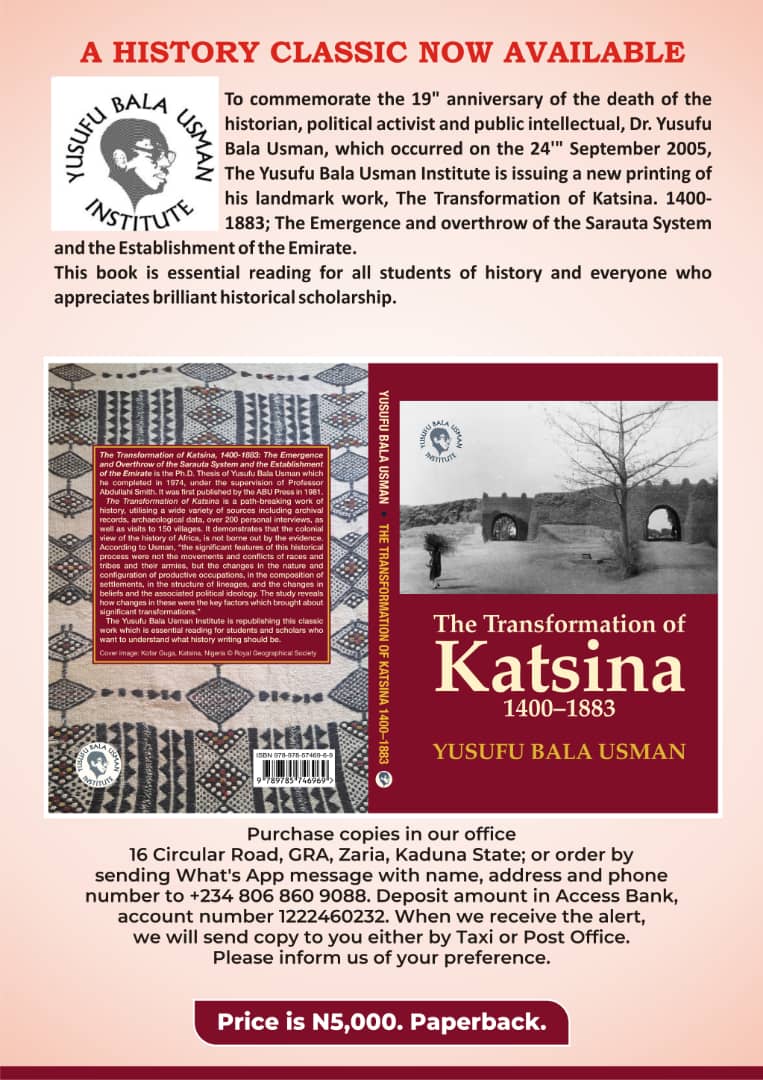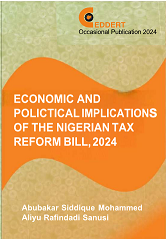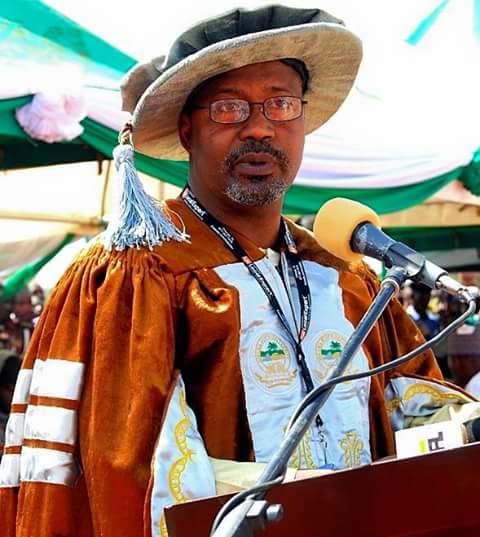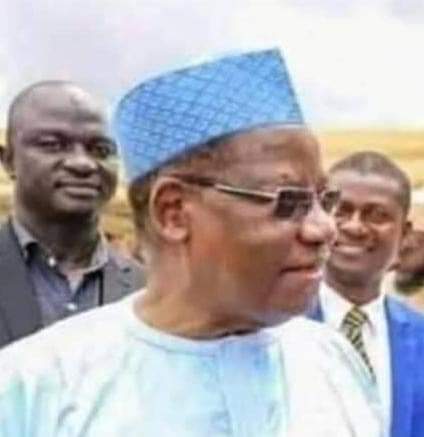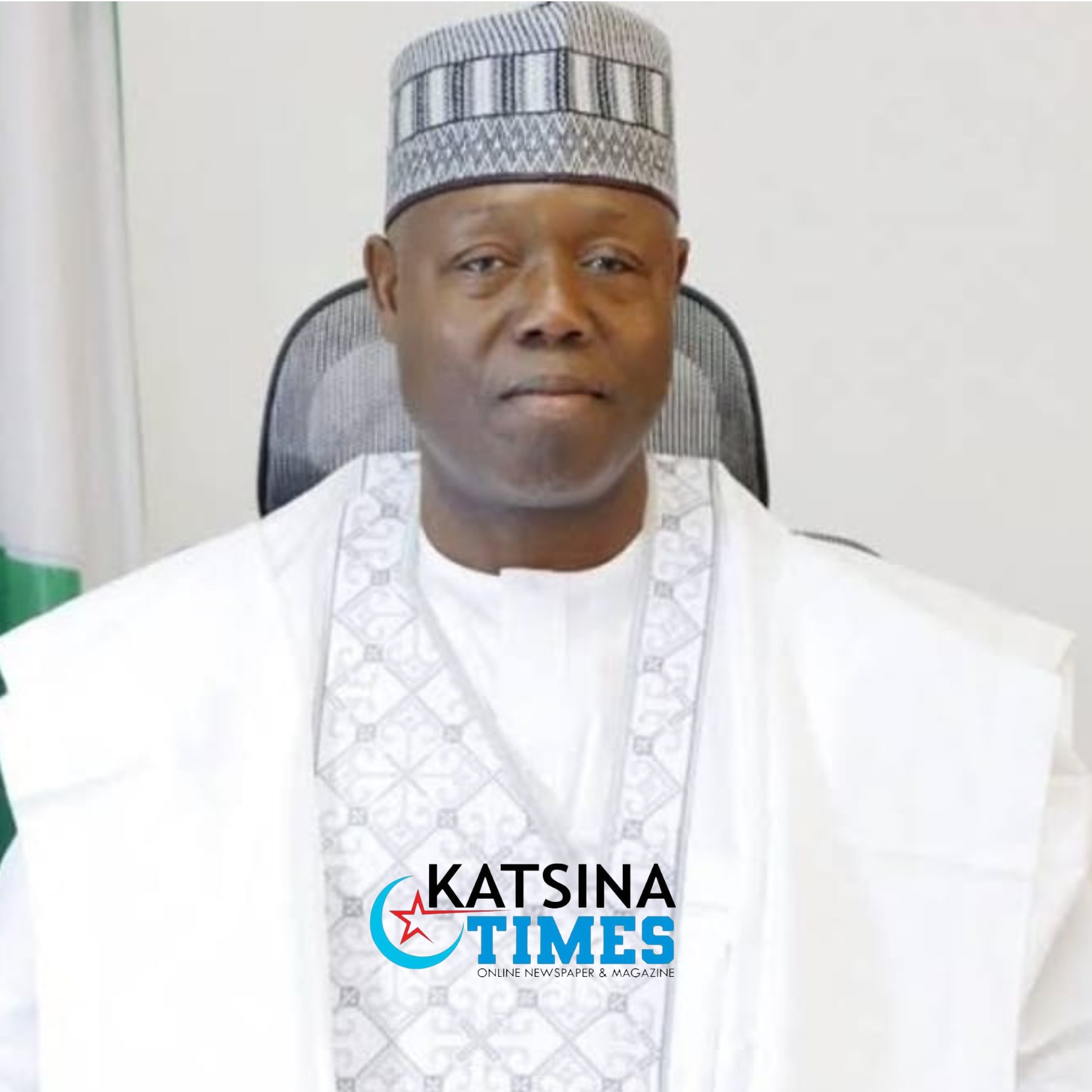The Heroes of Radical Politics in Katsina Emirate (II)
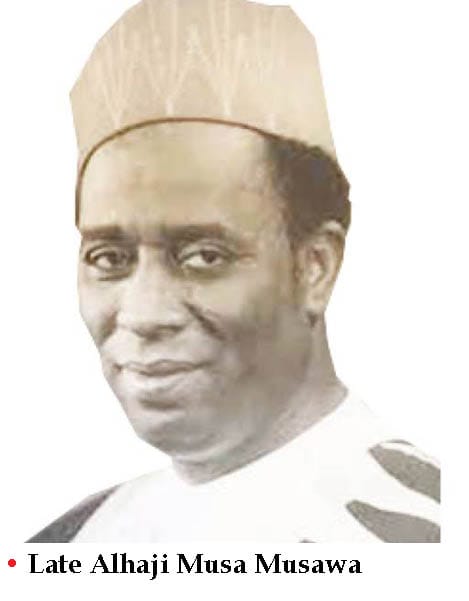
- Katsina City News
- 01 Sep, 2024
- 757
By Dr. Uwaisu Iliyasu, Head of Department of History and Security Studies. Umaru Musa ‘Yar’Adua University, Katsina
Life and Times of Alhaji Musa Musawa and His Political Activism
Musa Musawa was born on 1st April, 1937 at Bichi town, Kano state. His father was called Alhaji Baloni who hails from Bichi. His mother Amina was from Musawa who passed away when he was a baby. His father never remarried after the loss of his mother and he was sent to his mother’s village in Musawa to live with his aunty. In an interview he said ‘my aunty (Halima) was a true woman of substance who instilled a sense of independence, confidence in me’ . Musa grew up in a very hard, rural environment; the youngest of three children in a family who constantly struggled to make ends meets. As the tradition in Hausa society, a child would start attending Qur’anic School before going to western school. He first attended Malam Idris School at Musawa. At the school he learnt how to read the Holy Qur’an.
At the age of ten, Musa was sent back to Bichi to attend school. This was because in those days there was no school in Musawa. As such he was sent back to father’s town to school there. At Bichi, he was enrolled at primary school and gradually became a role model for other children around him. He always appeared on clean school uniforms and consistently demonstrated his ability to read, write and understand simple English. At Bichi, he saw the autocratic and feudalistic actions of both the colonial and the Native Authorities. According to him he felt that there was a driving and throbbing need to stand up for the downtrodden and poor in the society.
After finishing primary school at Bichi, Musa went to Kano Middle school in 1946. He put himself through school and fought to remain and excel there; and he skimmed through while working hard. It was during this period NEPU ideas began to boil in Kano and its environs. Thus, the ideas of the party attracted many people. From Bichi some of the students that were attracted by Malam Aminu include Musa Musawa, Alhaji Ali Abdullahi etc. Indeed, he went further to state that
Malam Aminu began a movement of young radical who were eager to fight for change under NEPU. I became one of the active members of NEPU to the extent that I rose to the position of Youth Chairman of the party in Bichi and together with the likes of Alhaji Ali Abdullahi.
However, after finishing Middle school, Musa went to the University of Ibadan to study public administration. Immediately after graduation in 1959 he was employed by the British Broadcasting Corporation (BBC)) African Service in 1962. He stayed at BBC for five years before proceeding to Cambridge University to study Chinese Language in 1967. After finishing his studies at Cambridge, he gained employment with Nigerian Foreign Affairs and was posted to Uganda and later transferred to India. He continued to be in foreign affairs up to 1979 when the country was returned to civilian rule by President Olusegun Obasanjo. After series of consultations, Musa Musawa resigned his appointment and joined politics in 1979.
Like most of his contemporaries, certain factors shaped his political activism and determined the direction of his outlook. As it has been shown in the above subheading, Musa joined NEPU when he was at Middle school. According to him the reason why he choose NEPU was because he found himself in a condition where atrocities and injustice were common place. The N.A system did not represent the common man. And since he had no say in the running of the affairs that affected him, the common man would hardly expect his welfare to be given due or proper attention. So, the condition became unbearable that the common man had to demand for emancipation from such bondage which denied him basic rights.
The recognition of such basic rights made Musa to appreciate the noble cause of being persuaded by Malam Aminu Kano and his compatriots in their campaign against colonial domination and the oppression of the northern oligarchies. Therefore within a short period of time NEPU activism shaped the political career of Musa to the extent that one day when he paid a visit to his aunty he accused the traditional rulers being injustices in the case of Balan Shaba who was said to have been several times flogged and detained on his failure to pay tax. Not only this, his working career at the foreign affairs also shaped his political activism. This is because his interaction with many people of diverse origin especially in Uganda and India helped greatly in shaping his thought and thinking toward politics.
At Uganda for example, he was said to have read some books on Ugandan liberation movement especially on the issue of European exploitation of the people of the area. Furthermore, at India the activities of Mahtama Gandhi, no doubt served as another impetus for his political activism. This is because he came to learn the nature of political struggles in India and how Gandhi fought the independence of India from the British colonial masters. Part of the impacts of this development was his attempt to awaken his people into realising that Musawa town and indeed Katsina province were not Islands on to themselves, but were members of a much wider world. As such people should woke up and fought man’s exploitation against his fellow human beings.
Another factor which had direct consequences on the political activism of Musa Musawa was the Daily Comet and West African Pilot newspapers. This is because Musa took time to reading the papers and became astonished at their fiery advocacy for social justice. He also found time to read Gaskiya Tafi kobo, a Hausa weekly newspaper published in Zaria. Besides, he had the chance of reading some English newspapers from abroad whenever he visited the British Library in Kano. The newspapers conveyed stories and ideas so lucidly and graphically captured his imagination especially on the way they dealt with issues of national priority. The newspapers infused in him a determination regardless of the difficulties he faced to liberate his people from the many ills bedevilling his society. He said, ‘I remained focused on the pursuits of democracy and social justice. Faith in the correctness of his cause and strong will motivated him to surmount many obstacles’.
However, by 1979 when the country returned to a democratic rule, Musa joined the PRP. According to him the reason why he joined the party was because of its attempts to fight injustice and ensure universal freedom for all. He further stressed that he joined the party because it founding fathers were all old NEPU members who they had struggled together with during the First Republic. Even though his entry into the PRP was viewed with suspicion. To this end Lawal Danbazau submitted that
At the inaugural meeting of the PRP Musa Musawa came with his new car and convened Malam Aminu to the venue of the meeting. After the meeting, Malam entered the car for Kano in the name that Musa had joined the PRP. Soon after joining the party many people began to suspect Musa Musawa on the ground that he was sent by the NPN to check the activities of the party and even contested the position of treasurer of the party. Through which he could know the source of the party in terms of money and logistics.
In spite of mixed feelings by several individuals, Musa remained in the party and emerged its National treasurer in 1979. Musa continued to be in this position until 1983 when the first tenure ended. As one of the national leaders of the party, he bought the ticket for gubernatorial election in Kaduna state. He was lucky that the party approved his nomination as its candidate for the election. By implication he was to contest with Alhaji Lawal Kaita the gubernatorial candidate of the NPN. Election was conducted and Lawal Kaita of NPN won the election thereby defeating Musa Musawa of the PRP. This did not stop Musa from active participation in politics up to the time when General Muhammadu Buhari staged a coup against President Alhaji Shehu Aliyu Shagari in 1983.
The military government banned all the political parties in the country to the extent that political office holders were jailed or sentenced for some years in imprisonment. This brought the end of party politics until in 1992 when President Ibrahim Badamasi Babangida attempted to return the country to a civilian rule. Musa Musawa joined the SDP as one of the party caucus in Katsina state. He was said to have played important role in the consolidation of the party in the state. Added to this according to Lawal Kaita ‘Musa Musawa was the man behind the defeat of NRC in Southern Katsina. The defeat demonstrated the political activism of the man in the Southern part of the state’.
After a long period of military rule in the country, the death of Abacha in 1998 and the emergence of President Abdulsalam Abubakar, the country was returned to a democratic rule in 1999. Therefore with the return of democratic rule, Musa joined the PDP and eventually became its first Chairman in Katsina state. He retained the position up to 2003 when the Governor of the state, Umaru Musa Yar’adua base on the constitution of the party dissolved the executive of the party. Thus, Musa was made one of the elders of the party throughout the second term and after when Ibrahim Shehu Sheme emerged as the Governor of the state. This was the situation up to 2015 when the PDP was defeated by the APC. Even though Musa remained in PDP, but he was one of the key players that contributed to its failure in the state. The reason for its failure according to him was because of lack of respect of party rules and regulations especially on the issue of contest, election and nomination of candidate. Along with this was problem of Governor Sheme on lack of consultation. A situation whereby politicians were relegated to the lowest level, as such politics in the state became a friends and family affair. This act infuriated most of the founding fathers of the PDP in the state. This was why during the 2015 election they did everything possible to make sure the party fail in all the elections conducted in the state. This scenario was captured by radio Nigeria Kaduna when Musa Musawa was interviewed on the eve of the election in 2015. He said
We are the founding fathers of the PDP in Katsina state and we would be the once to make sure that the party fail at all levels in the state. This is because the leadership of the party was relegated to the detriment of friends and relatives.
This was how the PDP failed during the 2015 general elections in Katsina state.

